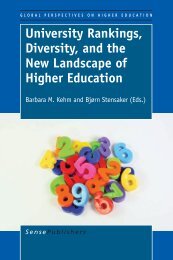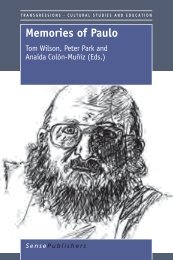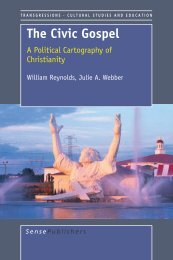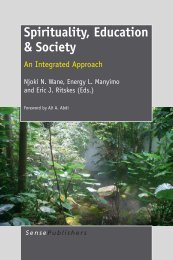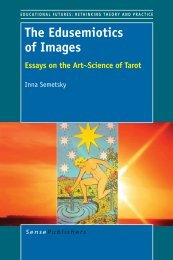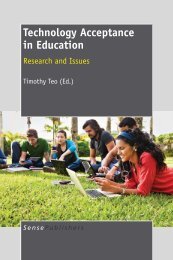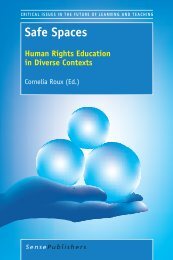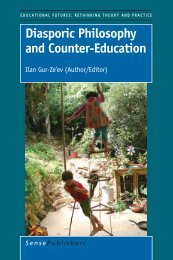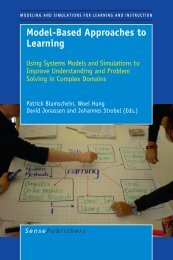Rupturing Concepts of Disability and Inclusion
Rupturing Concepts of Disability and Inclusion
Rupturing Concepts of Disability and Inclusion
Create successful ePaper yourself
Turn your PDF publications into a flip-book with our unique Google optimized e-Paper software.
CONCEIVING A QUILT: CREATING A METHOD<br />
nurture <strong>of</strong> such artifacts as memories, histories, stories, photographs <strong>and</strong> unconditional<br />
close loving relationships are testament to that.<br />
In many situations, therefore, inclusion is an ideal state – something imagined<br />
<strong>and</strong> sought, not yet arrived at, but continuously strived for. This research contends<br />
that not only do socio-ethical spaces <strong>of</strong> exclusion <strong>and</strong> inclusion exist, but also that<br />
‘traditional’ socio-ethical spaces espoused to be inclusive, construe to sustain<br />
structural exclusion for people with disability, particularly intellectual disability.<br />
To elaborate, a conceptual theoretical <strong>and</strong> multidisciplinary approach will expose<br />
the implicit exclusion within traditional methods, resulting in their inadequacy <strong>and</strong><br />
incompetency to address inclusion. The irony <strong>of</strong> this situation should not go<br />
unnoticed. As has already been articulated, non-inclusion or exclusion for people<br />
with intellectual disability has traditionally been explained because <strong>of</strong> the<br />
perceived inadequacy <strong>and</strong> incompetency <strong>of</strong> these persons to be rational individuals.<br />
However, I am suggesting that it is not a notion <strong>of</strong> impaired bodies that presents<br />
barriers to Ethical <strong>Inclusion</strong>: rather, it is impaired ethical theorising. Therefore, I<br />
assert that the fraudulence <strong>of</strong> aporetic ethical foundations in contemporary<br />
disability practices must be confronted for ethical transformation.<br />
Pr<strong>of</strong>ound Exclusion <strong>and</strong> the notion <strong>of</strong> inclusion mapped under the three broad<br />
categories – Technical <strong>Inclusion</strong>, Legislative <strong>Inclusion</strong> <strong>and</strong> Ethical <strong>Inclusion</strong>, embrace<br />
different dominant themes <strong>of</strong> inquiry. For example, Pr<strong>of</strong>ound Exclusion <strong>and</strong> Technical<br />
<strong>Inclusion</strong> embrace a socio-historical positivist critique, Legislative <strong>Inclusion</strong> - a<br />
socio-political interactionist, interpretavist or phenomenological critique, <strong>and</strong> Ethical<br />
<strong>Inclusion</strong> – a socio-political-ethical-structuralist critique. Methodologically, these<br />
different themes <strong>of</strong> inquiry cannot be ignored; but rather need to be embraced <strong>and</strong><br />
exp<strong>and</strong>ed to enable an adequate analysis <strong>of</strong> the conceptualisation <strong>and</strong> ethical<br />
significance <strong>of</strong> the notion <strong>of</strong> inclusion to emerge. Undertaking a complex <strong>and</strong><br />
multidisciplinary approach recognises that the inclusion-exclusion dualism is<br />
experienced not only within socio-temporal, socio-relational, socio-visual or sociopolitical<br />
spaces, but also that these spaces together are components <strong>of</strong> a wider<br />
embracing, but conceivably dominant <strong>and</strong> restrictive, socio-ethical space – a space<br />
traditionally not embracing <strong>of</strong> the particularities <strong>of</strong> embodied identities. Diprose<br />
reinforces this assertion when she states that ethics is <strong>of</strong>ten thought <strong>of</strong> as “either the<br />
study <strong>of</strong> the logical status <strong>of</strong> our moral judgements or as setting down a set <strong>of</strong><br />
universal principles for regulating behaviour”, assuming that “individuals are<br />
present as self-transparent, isolated, rational minds <strong>and</strong> that embodied differences<br />
between individuals are inconsequential.” 114 Branson <strong>and</strong> Miller would contend,<br />
then, that this approach to ethics constitutes “epistemic imperialism” for its embeddedness<br />
in Western society <strong>and</strong> its propensity to organise ‘reality’ in a particular<br />
way. This, they identify, necessitates an “unitary, logocentric, phallogocentric<br />
orientation,” appropriating <strong>and</strong> devaluing ‘others’ by processes <strong>of</strong> “packaging,<br />
labeling, <strong>and</strong> controlling.” 115 This indeed emerges as impaired ethical theorising.<br />
On the other h<strong>and</strong>, though, Diprose contests that even if it is granted that ethics<br />
is about moral principles <strong>and</strong> moral judgment, ethics is also about location, position<br />
<strong>and</strong> place. This research will encompass this latter statement within its exploration<br />
<strong>of</strong> the ethical significance <strong>of</strong> inclusion. It is imperative that the hegemonic genesis<br />
<strong>of</strong> the traditional approaches to applied ethics <strong>and</strong> the legitimacy <strong>of</strong> their orthodoxy<br />
27





